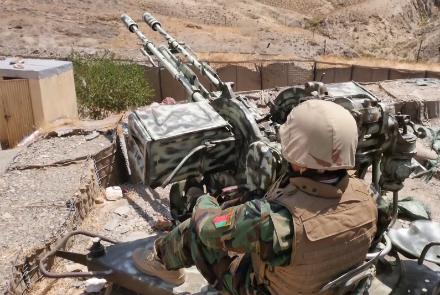21 Provinces See Fighting in Last 24 Hours: MoD

Amid efforts for peace and hopes to end decades of conflict in the country, the Ministry of Defense on Sunday said that at least 21 provinces of the country—out of a total of 34—have witnessed clashes between security forces and the Taliban over the last 24 hours, maintaining a trend that has been consistent over the past few weeks.
The Defense Ministry said the Taliban’s attacks in the 21 provinces have been “pushed back” by Afghan forces, which are in “active defense” mode, and that the group has suffered “heavy casualties.”
Data by security agencies show that the Taliban has conducted attacks in 20 to 25 provinces a day over the last week.
The provinces that witnessed clashes in the last 24 hours are Laghman, Kunar, Nuristan, Nangarhar, Ghazni, Maidan Wardak, Logar, Zabul, Kandahar, Badghis, Farah, Faryab, Balkh, Helmand, Nimroz, Badakhshan, Baghlan, Takhar and Kunduz, according to the Defense Ministry.
“The Taliban launched attacks on outposts of the Afghan forces and military centers in 21 provinces of the country. The government forces repelled their attacks and have inflicted casualties to the enemy,” said Rohullah Ahmadzai, spokesman for Ministry of Defense.
However, a Taliban spokesman said that the group’s attacks have been reduced compared to the past and that they are only responding to attacks by government forces.
“We will have a tough winter due to the war because the Taliban will not be convinced by small gifts and are expecting bigger ones. The bigger gift is either handing over the whole government or at least a key military part of the government (to the Taliban),” said Assadullah Nadim, a former military official.
The defense committee of the Wolesi Jirga, the Afghan parliament, said people’s trust in the peace process will dwindle if the two sides delay in agreeing on an immediate reduction in violence and a ceasefire.
“Everyone is expecting a ceasefire. Anyone who dies– from the government, the people, or the Taliban–is Afghan. The people will lose their hope if violence continues,” said Abrarullah Murad, head of the commission.
Recent clashes between the Taliban and the government forces have inflicted casualties on Afghan troops as well as civilians. The two sides have often blamed each other for civilian casualties in their attacks and operations.
Meanwhile, some relatives and families of war victims and human rights activists at a gathering in Herat on Sunday called for an end to bloodshed in the country.
They called on the United Nations to put pressure on the government and the Taliban to reduce violence and agree on a ceasefire.
“We call on the United Nations and human rights institutions to break their silence on violations of human rights in Afghanistan and make efforts for peace and justice to victims’ families,” said Sayed Ashraf Sadat, a civil society activist in Herat.
“There is talk on one side and bloodshed on the other. Innocent people are killed every day. All highways are filled with mines,” said Tor Mohammad Zarifi, a tribal elder.
Sayed Rasul, a resident of the Pashtun Zarghon district in Herat, said he has lost three of his children in the war. He called on the Taliban to agree on an immediate ceasefire.
“War has inflicted this damage on: I have lost three of my children. One of them was 14, another was in the eleventh year of school and the third one 13 years old. They were stuck in a conflict and were killed in an airstrike,” Rasul said.
Herat residents said some of them have left their houses and have been displaced to the city of Herat due to conflict in their areas.
“We left everything. Our houses were damaged,” said Ghulam Sarwar, a resident of Herat.
“We left our houses. If we didn’t, we would all have died. We want help,” said Khair Ahmad, a resident of Herat.
